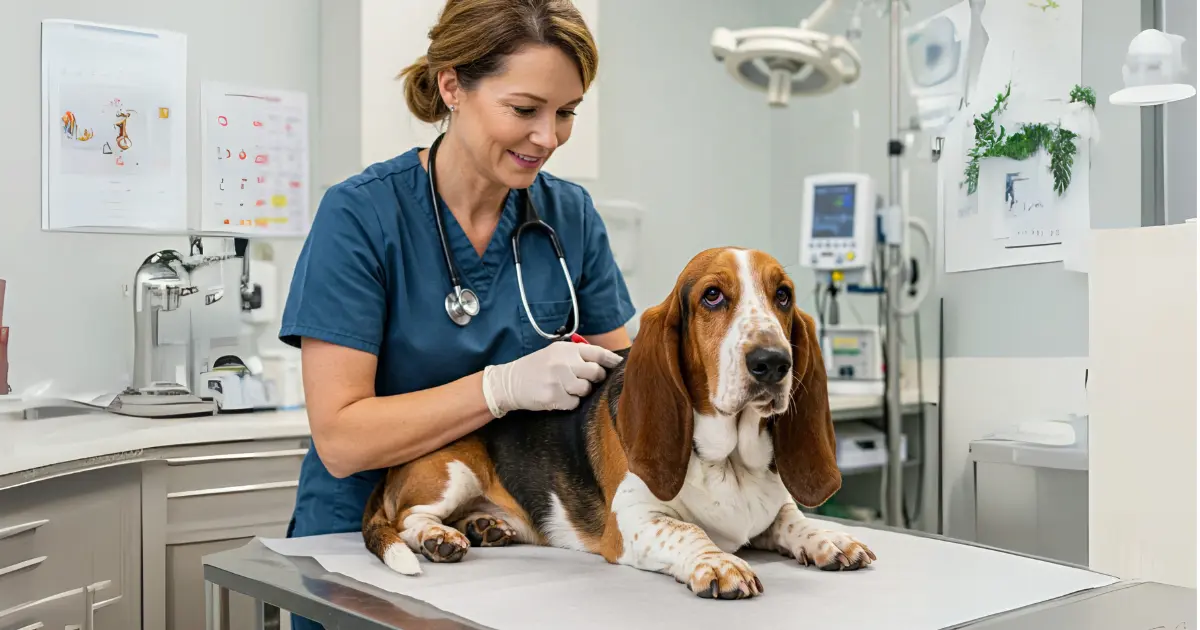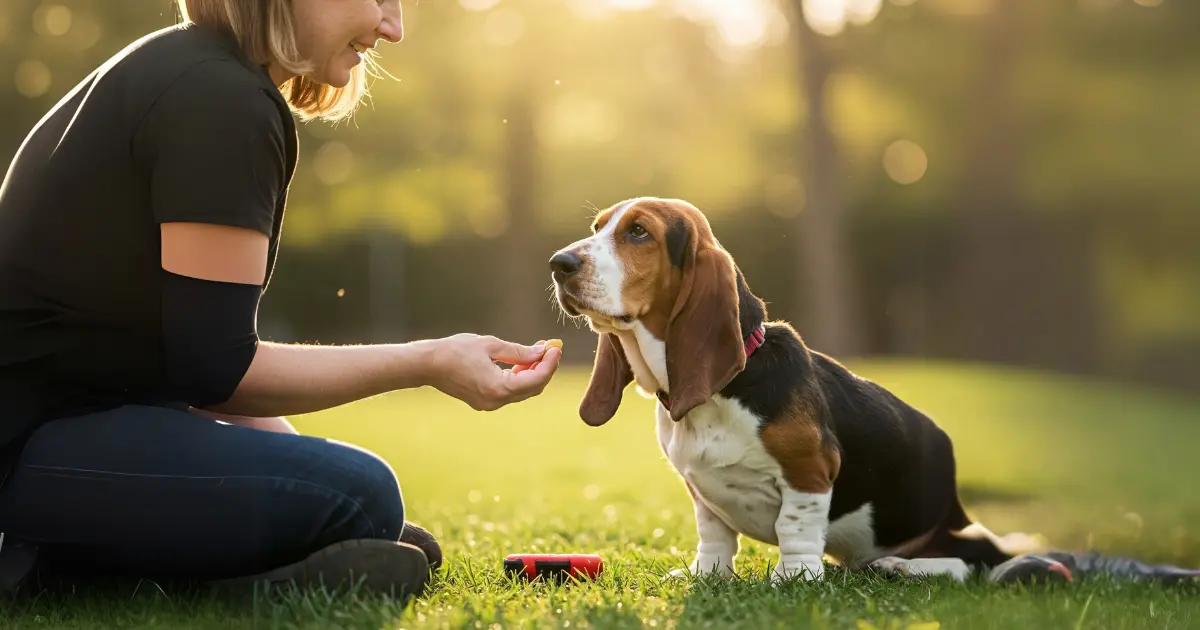Basset Hound Breeding Problems: What Every Breeder Should Know
Published: 6 Mar 2025
Basset Hounds are charming dogs with droopy ears, a sad-sounding bark, and loving personalities. They make great pets, but breeding them has challenges like any dog. If you’re considering breeding Basset Hounds, you must be aware of the common Basset Hound Breeding Problems that can arise to keep the dogs and their puppies healthy.

This guide will review the common issues breeders face when breeding Basset Hounds and provide helpful tips on how to breed them responsibly. Whether you’re a first-time breeder or experienced, this article has valuable information to help you.
Table of Contents
1. Common Problems in Basset Hound Breeding
Health Problems in Basset Hounds
Basset Hounds are susceptible to a few health problems that breeders should be aware of. These issues are often inherited, so it’s essential to ensure both male and female dogs are healthy before breeding. Some common health problems in Basset Hounds include:
- Hip and Elbow Dysplasia: These joint problems can cause pain and difficulty walking, especially as the dog ages. Research shows that around 20-30% of Basset Hounds have hip dysplasia, so testing both parents before breeding is essential.
- Ear Infections: Basset Hounds have large, floppy ears, which make them more likely to get ear infections. So’ Regular ear cleaning and checking for signs of disease can help prevent this.
- Obesity: Basset Hounds tend to gain weight quickly, which can damage their joints, hearts, and overall health. Keeping them at a healthy weight is important, especially when considering breeding.
Before breeding, ensure both male and female dogs have had health tests, including for hip and elbow dysplasia, eye problems, and other inherited conditions.

Overbreeding: The Risks
Overbreeding means breeding a dog too often, which can be harmful. Here’s why overbreeding should be avoided:
- Health Problems for the Mother: Constant pregnancies can tire and weaken the mother dog. It can also cause complications like infections or trouble giving birth.
- Behavior Problems in Puppies: If the mother is overbred, it can affect her health and the puppies she produces. The puppies might inherit temperament problems or health issues.
Tip: It’s best to breed a female Basset Hound no more than once a year. Ideally, she should have no more than 3-4 litters to ensure she stays healthy.
Breeding Too Early
Breeding a dog before she’s fully grown can cause problems for both the mother and the puppies. Female Basset Hounds should not be bred until they are 2 years old. Here’s why:
- Health Risks for the Mother: A young dog’s body may not be ready for pregnancy, and it can lead to complications.
- Undeveloped Puppies: Puppies born to young mothers may have health problems, such as low birth weight or weak immune systems.
Wait to breed until the female Basset Hound is mature (around 2 years old). This ensures her body is ready, and she can have healthy puppies.
Choosing the Right Breeding Pair
Choosing the right dogs to breed is necessary for the health and well-being of the puppies. You want to ensure both dogs are healthy and have sound temperaments. Choosing the right dog breeds for breeding is crucial. For example, the European Basset Hound is popular among breeders for its temperament and characteristics.
- Health Tests: Ensure both dogs are healthy and free from inherited conditions like hip dysplasia, eye problems, or thyroid issues.
- Temperament: The dogs should have calm, friendly personalities. Don’t breed dogs with aggressive or fearful tendencies.
Always get both dogs tested for common genetic issues and ensure they have sound temperaments. This will help you raise healthy, well-adjusted puppies.

2. Temperament Problems in Basset Hounds
Behavior Issues
Basset Hounds are known for being friendly and calm, but some can have behavior problems. Puppies can inherit their parents’ temperament, so choosing parents with stable, calm behavior is essential. Some common issues include:
- Fearfulness: Puppies that aren’t appropriately socialized from a young age may grow up fearful of people, other animals, or new experiences.
- Aggression: Although not common, some Basset Hounds can be aggressive if they’re not appropriately socialized or have bad experiences when they’re puppies.
Training Challenges
Basset Hounds are clever but stubborn, making Training difficult. Some may take longer to train than others. Early training is essential to ensure that puppies grow up well-behaved.
Tip: Start training early using positive reinforcement (treats and praise). Be patient and consistent, and always use kind methods.
3. Pregnancy and Birth Problems
Health Risks During Pregnancy
Pregnancy in Basset Hounds is usually straightforward, but there are some risks to watch for:
- Gestational Diabetes: Just like humans, pregnant Basset Hounds can develop diabetes, which can cause problems for both the mother and the puppies.
- Low Birth Weight Puppies: Puppies born to underweight mothers or mothers with health problems may be born small and weak.
During pregnancy, have the mother checked regularly by a vet. Blood tests and ultrasounds can help monitor her health and the puppy’s development.
Birthing Complications
Basset Hounds have short legs and large bodies, which are sometimes challenging to give birth to. Some problems include:
- Need for a C-Section: Sometimes, Basset Hounds need a C-section to deliver their puppies, especially if they are large or the birth isn’t progressing.
- Post-Birth Care: After giving birth, the mother should be carefully watched to ensure she’s recovering suitably and has enough milk to feed her puppies.
Be prepared for the possibility of a C-section. It is also a good idea to have a vet ready in case of complications.

4. Puppy Socialization: Why It’s So Important
The Importance of Early Socialization
Socializing puppies is one of the most essential things a breeder can do. If puppies are not exposed to new people, animals, and environments during their early weeks, they can grow fearful or aggressive. Here’s what you need to know:
- Fearful Puppies: Puppies that aren’t adequately socialized may become scared of new people or situations.
- Aggression: Puppies that don’t interact with other dogs or people may become territorial or aggressive.
Start socializing puppies at around 3 to 4 weeks old. Introduce them to different people, pets, and experiences positively and gently.
How to Socialize Basset Hound Puppies
To help puppies grow up to be confident, well-behaved dogs, you need to:
- Expose them to different people: To prevent fearfulness, let puppies meet people of all ages, genders, and appearances.
- Introduce them to other animals: To prevent aggression, puppies must interact with other dogs and animals.
- Use positive reinforcement: Reward puppies with treats and praise when they interact with new things calmly and friendly.
5. Ethical Considerations for Breeding
Why Ethics Matter in Breeding
Ethical breeding is not just about making puppies—it’s about ensuring the dogs are healthy and cared for. Ethical breeders focus on the following:
- Health: Breeding dogs that are healthy and have been tested for genetic conditions.
- Temperament: Breeding dogs with good, stable personalities.
- Avoiding Overbreeding: Ethical breeders don’t breed dogs too often or in poor health.
Always choose breeders certified by recognized organizations like the American Kennel Club (AKC) who follow responsible and ethical breeding practices.
Conclusion
Breeding Basset Hounds requires careful attention to their health and well-being. By avoiding overbreeding, selecting healthy parents, ensuring early socialization, and staying informed about potential pregnancy or birth complications, breeders can help ensure the mother’s and her puppies’ health.
Breeding Basset Hounds responsibly improves the breed and creates happier, healthier puppies for families to enjoy for years to come.
FAQs
1: What health tests should I do before breeding my Basset Hound?
Be sure to test for hip and elbow dysplasia, eye problems, and thyroid conditions. These tests are important to ensure that the parents are healthy and free from genetic issues.
2: How can I prevent ear infections in my Basset Hound during breeding?
Clean your dog’s ears regularly, keep them dry, and examine for any signs of infection. Regular ear care is key to preventing issues.
3: What are the risks of overbreeding my Basset Hound?
Overbreeding can lead to health problems for the mother, such as exhaustion and infections, and it can also lead to behavior problems in the puppies.
4: At what age is it safe to breed my Basset Hound?
It’s best to wait until your female Basset Hound is at least 2 years old before breeding. This ensures she is fully grown and healthy.
5: What health tests should I do before breeding my Basset Hound?
Yes, you can breed a Basset Hound with another breed, but ensuring both dogs are healthy and have good temperaments is vital. Always check with a professional to make sure it’s done responsibly.
6: How often should a pregnant Basset Hound visit the vet?
It is a good idea to take your Basset Hound to the vet about every 2-3 weeks during pregnancy. Closer to her due date, more frequent visits may be necessary to monitor her health and the puppies.
7: Can Basset Hounds give birth naturally, or will they need surgery?
While many Basset Hounds give birth naturally, some may need a C-section, especially if the puppies are large. It’s always good to be prepared for this possibility with your vet’s help.
8: How can I tell if my Basset Hound is pregnant?
You might notice changes like more eating, weight gain, and a bit more affection. A vet check-up, like an ultrasound, is the best way to confirm pregnancy.
9: How often can a Basset Hound be bred?
To protect her health, it is recommended that a female Basset Hound be bred only once a year. Overbreeding can cause serious health problems for her and the puppies.
10: When is the best time to start training Basset Hound puppies?
Start training your Basset Hound puppies around 3-4 weeks old. The earlier you begin socializing and exposing them to different people and environments, the better behaved they’ll be later on.

- Be Respectful
- Stay Relevant
- Stay Positive
- True Feedback
- Encourage Discussion
- Avoid Spamming
- No Fake News
- Don't Copy-Paste
- No Personal Attacks



- Be Respectful
- Stay Relevant
- Stay Positive
- True Feedback
- Encourage Discussion
- Avoid Spamming
- No Fake News
- Don't Copy-Paste
- No Personal Attacks





